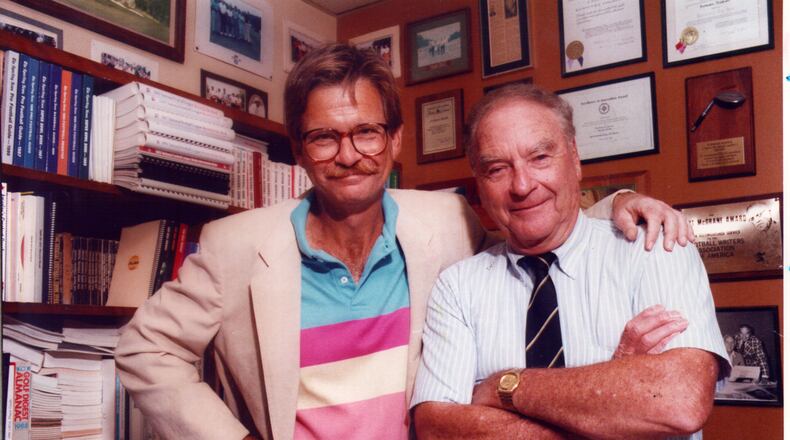Originally published March 23, 1994
Moreland, Ga. — Nowhere is death more emotionally rending than in a small town. In small towns, everybody is everybody else's neighbor. Life is intimate. Any loss is something personal. Grief runs deep. Death in the city is like death on the battlefield. Nothing slows down. Life careens on down its reckless course.
Especially does death gnaw at the heart of a small town when one of its own who traveled far, became a celebrated personality, comes home in a box in the prime of life. What the hometown will never quite realize is that no matter how far the journey, whatever the degree of fame, to return to one's roots is to be absorbed, to be one of the neighbors again.
Moreland put to rest its most famous citizen Tuesday. Lewis McDonald Grizzard Jr. was too young to be taken out, about half of his life lived. The day before, we had said our farewells to Charlie Roberts, who was 83. It has been a saddening week. Charlie had given space in our papers to more young athletes than any person whoever drew a check there. His hat was his familiar trademark, as were Grizzard's sockless feet. (I once sent Lewis a dozen pair of socks from our mill in North Carolina. They're probably still in his drawer.)
Decor by nature's hand
I had said to my sister by telephone, "I don't understand. Grizzard was so young. I guess you could say it was Charlie's time to go."
"It is not for any of us on Earth to decide when it is time to go, " she said. She is a righteous lady.
Moreland is about the size of my little hometown in North Carolina, and Moreland sat ablaze under a spring sun Tuesday afternoon. All around were signs of a seasonal awakening, blossoming of the red plums, redbuds, forsythia, daffodils or jonquils, or whatever they may have been. Nature was brightening up the sleepy town in honor of its celebrity. Unfortunately, he didn't make it. He was being cremated in Macon at the time.
This was how Lewis's service differed from those you're accustomed to in a small town. The emotional highlight usually is the opening of the casket for the final viewing of the deceased. Dressed out in their Sunday best in the middle of the week, townspeople file by in solemn ritual, then watch closely as the family gathers around. They want to be able to give a reliable report the next day when anybody asks, "How'd they take it?" as somebody always does.
The hometown choir sang with earnestness the two songs Lewis wanted sung at his funeral, "Amazing Grace" and "Precious Memories." We've all grown up with songs we were taught at the hometown church. Somehow, though, they don't find a place in the mellow part of our being until we've grown older and put distance between us and those compulsory Sunday morning services.
I'll go for "Amazing Grace, " but I'd like it played on a bagpipe. And I've told Josh Powell I want him to take care of himself, for I want him to sing "How Great Thou Art" at my crossing of the bar. My services will require only a small cast.
Humor, grace and brevity
Everything else would have met Lewis's critical approval, I'd surmise. The ministers leaped to their assigned segment with grace and brevity. Oldtime preachers used to take advantage of a funeral to lay a full sermon on their captive congregation. Ray Goff, Lewis's favorite football coach — not to take anything away from Vince Dooley, who was there — and Jim Minter, Lewis's favorite editor, gave the occasion a proper injection of encomium and humor.
One thing Minter said that struck deep, and makes one feel cheated that Lewis is gone so soon. "He had so many things he wanted to get done," Jim said. "He was already planning his next book."
Well, there isn't much left that hasn't been said about the passing of Lewis. The sun set on Moreland Tuesday, as it usually does. It arose again this morning, as it usually does. That is to say that life goes on. But there is a hollowness in it, not that we shouldn't have come to reason by this time that in the end there is but one winner. Shakespeare wrote it the way it is best said, I guess:
"Of all the wonders that I yet have heard,
It seems to me most strange that men should fear,
Seeing that death, a necessary end,
Will come when it will come.”
Another column about Lewis Grizzard by Furman Bisher: Not as much fun without Grizzard
About the Author
Keep Reading
The Latest
Featured



